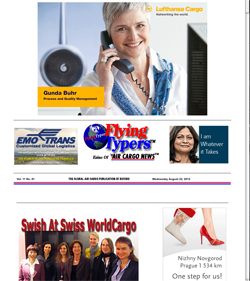| 
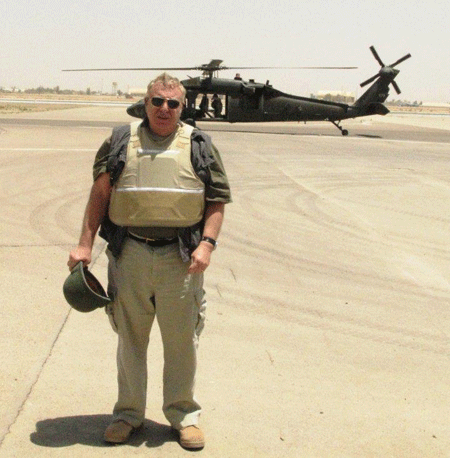 Sometimes
when the air cargo industry
awards season rolls around,
we start thinking: Sometimes
when the air cargo industry
awards season rolls around,
we start thinking:
Why
isn’t there an award
for all the true-blue, unvarnished,
unsung heroes of air cargo?
There
is certainly plenty of recognition
and (even self-aggrandizing)
advertising extolling the
virtues of great companies
and people, and also superior
programs, all of which are
vying for air cargo industry
awards.
But
in an increasingly commercial
venture, we do wonder where
a selfless effort, beyond
award-driven individuals
and companies, can be recognized
just for the sheer decency
of saluting a job well done?
So
rather than just gripe about
industry awards, here begins
a series celebrating people,
companies and events in
the air cargo experience.
The
aim here is to tell stories
that touch the heart of
our global air cargo audience,
which, after all is said
and done, may be the best
award of all.
William
R. (Bill) Boesch is a high-level
executive who has been in
the transportation and logistics
industry for almost 50 years.
He
entered the field of global
transportation and logistics
in 1965 as a graduate student
working for Seaboard World
Airlines, a pioneering cargo
carrier serving the U.S.,
Europe, Africa, and Asia.
He
held various marketing and
operations management positions
with the company before
becoming its Vice President
and Director of Worldwide
Sales in 1978.
Mr.
Boesch assumed similar responsibilities
at Flying Tiger Line after
it merged with Seaboard
in 1980.
He
joined Emery Worldwide in
1982, a major airfreight
forwarder, aircraft operator,
and logistics provider,
as Vice President of its
International Division.
He
became Senior Vice President
and General Manager of Emery
in 1985 and Executive Vice
President and General Manager
in 1987, before leaving
the company to become Pan
American World Airways’
Senior Vice President of
Cargo.
Mr.
Boesch assumed broader responsibilities
as Pan Am’s Senior
Vice President for Passenger
and Cargo Operations at
the beginning of 1988, but
left later that year to
become American Airlines’
Vice-President of Cargo,
a division AMR wished to
expand.
He
became President and CEO
of the Cargo Division in
1991 and Chairman of the
Cargo Division in 1996.
Under Bill’s direction,
American became a world
leader in the air cargo
and logistics business,
with annual revenues of
over a billion dollars.
Bill
served as CEO of DLH/DP
Global Mail in 2004, led
the company out of its financial
difficulties, and managed
the integration with Smartmail.
He
directed the movement of
both companies’ corporate
headquarters and the branding
change to DHL Global Mail.
But
then Bill did something
a little different, taking
on a task (just recently
completed) as a transportation
advisor to the U.S. military—first
in Iraq and later Afghanistan.
His
work was not at some military
base stateside, either.
He
went and lived in both war
zones, operating in places
where he was constantly
in harm’s way, to
the point where he carried
personal weapons.
But
as with all things, Bill
Boesch, who has just recently
returned to America from
Afghanistan, is quite self-effacing
and even matter of fact
when talking about the high
adventure of supplying the
military with a critical
skill set after a remarkable
life in air cargo.
“I
went to both Iraq and Afghanistan
because I believed that
by organizing tribal transportation
companies we could significantly
reduce the number of American
casualties.
“The
War in Iraq was on going
in 2004 and the military
truck transportation was
taking very high hit-rates
(as high as 30 percent).
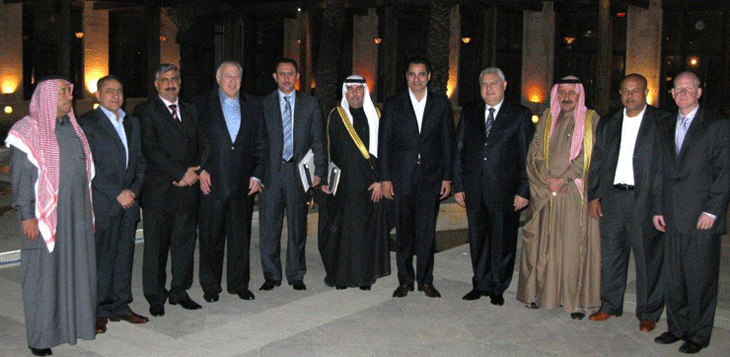 |
“The
soldiers guarding the supply
trucks, which were mostly
coming out of Kuwait and
were driven by USAF personnel
or 3rd country nations (people
from India, Pakistan, Philippines,
etc.), were hired by a Kuwait
company called Agility and
later PWC.
“Many
Iraqi people hated to see
these American goods moving
on non-Iraqi trucks with
non-Iraqi drivers guarded
by U.S. military gun-trucks,
rolling through their villages
while their people were
unemployed and their families
suffering from lack of food,
clean water, medical attention,
and schooling.
“Many
transferred these negative
feelings toward Americans
who said they came to liberate
them.
“As
a result these convoys were
reportedly continually attacked
with IEDs, rockets, or small
arms.
“My
feeling was, how do we explain
to a U.S. family that their
sons or daughters were killed
or mutilated guarding a
shipment of Kool-Aid soft
drinks?
“The
United States Secretary
of Air Force, Mike Wynn,
asked me to study the culture
of Iraq and see if this
gave us a hint on how to
improve the trucking operation.
“Right
away, the analysis needed
to take into consideration
that, in addition to being
Americans in a foreign country
and the challenge of foreign
language and cultures, the
complexity was doubled by
Sunnis and Shiites fighting
each other hand to hand,
which included pulling each
other off trucks, with beatings
and killing running rampant
“The
Sunnis also viewed the U.S.
as supporting the Shiites
after Sadaam Hussein’s
departure, which resulted
in the Sunnis in the West
and North supporting Al
Qaida.
“As
a counter the Shiites were
teaming up with Iran. So
the cultural complexities
within Iraq were extreme.
Our studies showed us that
the tribes were strong and
could protect the trucks.
“So
my task in Iraq and later
in Afghanistan was to reduce
number of American casualties
by working with the tribes
to get them to transport
our materials.
“I
went into Iraq as a civilian
businessman trying to find
and talk with the top tribal
sheiks, who were mostly
hidden because of fear of
being killed by the U.S.
forces.
“After
many months we penetrated
the tribes and set up tribal
companies to transport U.S.
goods in al Anbar within
the so-called ‘Triangle
of Death.’
“The
operation worked and the
trucks did not suffer any
attacks or loss of goods.
“We
then expanded to the Shiite
area in the South and finally
to the mixed regions in
the north.
“During
the 3 years of the Iraq
Transportation System’s
operation within Iraq, there
were no attacks on any of
our operated trucks.
“Further
the system is now credited
with taking over 300,000
U.S. soldier man/days out
of harm’s way.
“I
truly believe that many
of our soldiers came home
because of the work my team
accomplished.
“As
time goes on and peace finally
comes to this region, the
hope is that someday, with
all of the facts on how
our mission was conducted,
people will recognize the
scores of very brave people
who risked their lives every
day.
“They
are the true heroes in my
view.
“Because
Iraq was so successful,
once again we were down
on the ground attempting
the same type of program
in Afghanistan.
“Right
away we found out that Afghanistan
is quite a bit more culturally
complex than Iraq.
“The
tribal system was not as
strong as in Iraq, so we
had to deal with village
and tribal elders all along
the truck routes.
“We
formed a program to only
go to the most dangerous
areas in Afghanistan, which
were those areas that the
normal, military-contracted
trucks (Host Nation Trucking,
which was replaced by National
Afghan Trucking) would not
go even with full security.
“So
to get supplies to those
areas, either air or military
convoys were used.
“Our
elder operation, Afghan
Trucking Network, put together
the elders and started operations
with local village owner
operators in the west, then
went into the SW and connected
the two regions going through
the highly dangerous drug
smuggling regions. Again,
the systems were successful,
with the result that ATN
is credited with taking
over 16,000 U.S. soldiers
out of harm’s way,
with an on-time delivery
of goods reliability at
98 percent.
“For the moment, expansion
of this program has been
put on hold for technical
reasons so I am back in
the U.S., but think daily
of those brave man and women
fighting an unseen enemy
in the mountains of Afghanistan.
“Looking
ahead there is no reason
why the program cannot eventually
be resumed to the South
and the highly dangerous
Eastern areas of Afghanistan.
“The
need is great with so many
American lives at stake.
“I
cannot ever forget the personalities
and faces of our brave young
soldiers in these two conflict
zones, with the abiding
wish to continue to help
insure that many more soldiers
are taken out of harm’s
way so that they might safely
come back home.
“The
realization that my experience
might help save even one
soldier’s life has
led me to believe giving
back and helping others
is in fact the best work
of my life.”
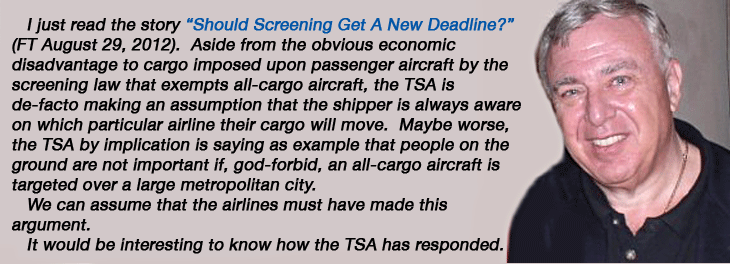 |
Cultural
and sociopolitical factors
form a balancing act that
is difficult to the extreme
in the case of the Middle
East, and it would be one
thing if that were all Bill
had to deal with. But unfortunately,
sometimes the simplest things,
like common practices for
best efficiency along the
cargo chain, become mangled
in the process.
“The
military moves long-haul
air cargo mostly through
AMC (Air Mobility Command),
which uses its organic aircraft
(C130s, C17s and C5s). Most
of the heavy-lift cargo
is moved on these aircraft
along with palletized cargo.
“AMCs
organic lift is supplemented
with CRAF (Civil Reserve
Air Fleet) using mostly
palletized cargo on commercial
747s—in both peacetime
and during conflicts. CRAF
can take all the committed
aircraft assigned to the
program depending on the
scale of the conflict.
“Within
Iraq, cargo was carried
by a few commercial carriers
who bid daily on the movements
using mostly low-cost Russian
aircraft (An12s or IL76s)
and crews.
“The
problems that I saw with
the movement of military
cargo were low utilization
of cube and weight.
“I
can understand this happening
from time to time on hot
incoming cargo, where it
would be against the mission
to delay material by waiting
for additional cargo to
fully utilize the cube and
weight, but I cannot understand
why this is happening with
outbound cargo during the
drawdown in both Iraq and
Afghanistan.
“The
military fully utilizes
the trucks so there must
be some reason why they
do not do the same with
aircraft.
“Many
pallets are built knee-high
and in a commercial operation,
that would never be acceptable.
“Also,
the booking and performance
systems need to be centralized
and done through one system,
as the systems in many cases
are different and cannot
synchronized with each other.
An example is that it is
difficult to book outbound
cargo because one of the
systems does not have a
code for that.
“Operations
like AMC try to do their
best to move cargo, but
are never-the-less criticized
by the in-country operations,
which appear to have lack
of control or oversight
of the situation,”
said Mr. Boesch.
With
admiration for companies
like Emirates, it’s
no surprise that after forty
years in the business, Bill
believes innovation technology
is the key to making cargo
a better business on the
global scale.
 “There
have been many improvements. “There
have been many improvements.
“The
industry needs to keep on
target with its IT systems
and find ways to be more
customer friendly and to
be compensated fairly for
product; it needs to have
a top focus on revenue per
tonne mile rather than load
factor; and it needs to
work with world governments
on security that protects
both the public and the
vital air cargo industry.”
With
his service having lasted
“five LONG years,”
Bill is finally ready to
settle a little bit at his
beach house in Treasure
Island; he’s most
looking forward to “getting
to know my two girls again.”
We
have in our minds the idea
of what makes a good soldier—Strength,
Efficiency, Caution, Intelligence—but
we seldom talk about the
other side of being a soldier:
Hope.
Without
Hope, you couldn’t
see the possibility for
changes, you wouldn’t
dare to make any, and you
would miss the most important
part of the job: coming
home.
It
sounds to us like Bill is
a true military patriot.
Geoffrey/Flossie
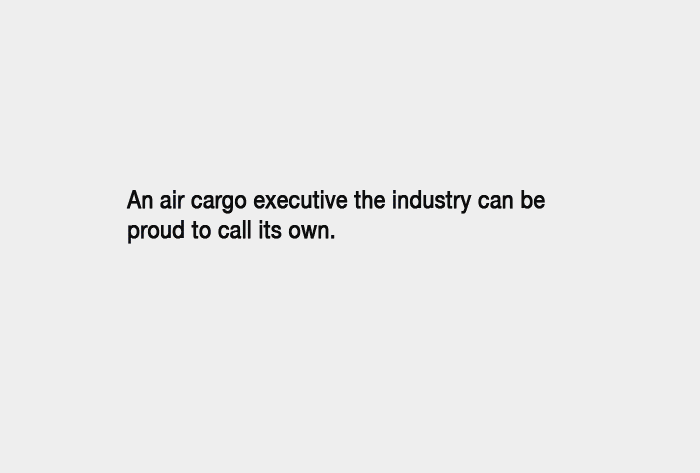 |
|




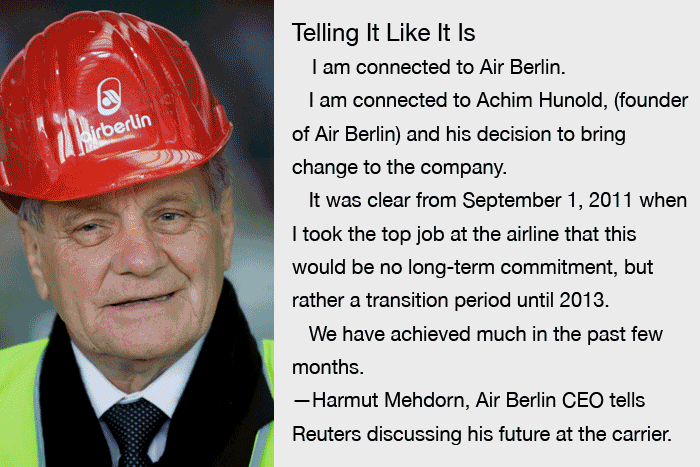

 Stan
Wraight is Managing Partner
of Strategic Aviation Solutions
International Inc.
Stan
Wraight is Managing Partner
of Strategic Aviation Solutions
International Inc.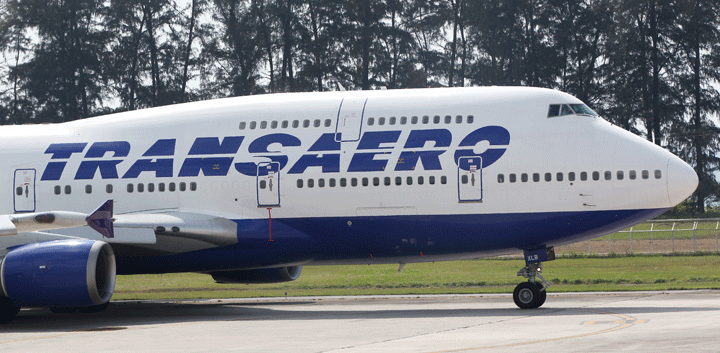

 Sometimes
when the air cargo industry
awards season rolls around,
we start thinking:
Sometimes
when the air cargo industry
awards season rolls around,
we start thinking:

 “There
have been many improvements.
“There
have been many improvements.


